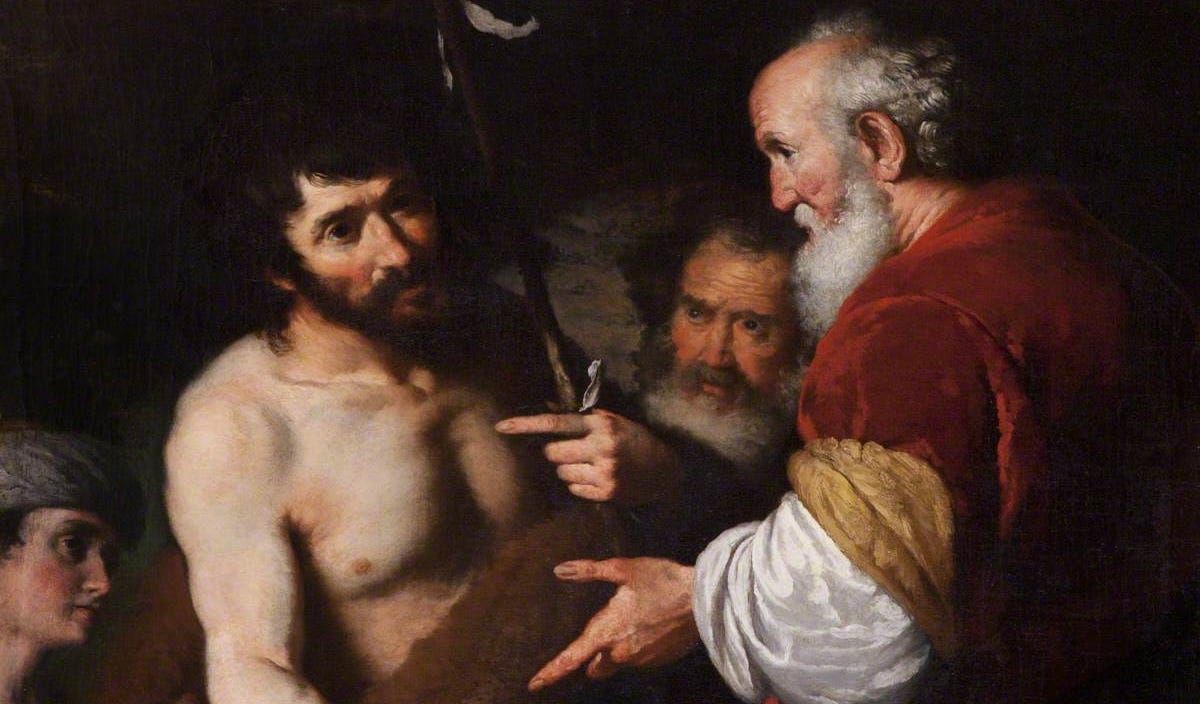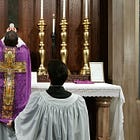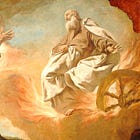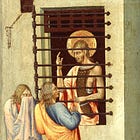The Sanhedrin's inquiry into St John the Baptist
What is the significance, often overlooked, of there having been a Sanhedrin inquiry into the mission of St John the Baptist?

Gospel for the Third Sunday of Advent (Gaudete Sunday)
In this passage, Fr Coleridge tells us:
Why St. John's baptism was necessary—to prepare souls for Christ through humility, penitence, and anticipation of the Baptism in the Holy Ghost.
How St. John's mission was rooted in Christ's authority—just as the Catholic Church's authority derives from Christ.
What St. John's humility reveals—his recognition of Christ's eternal preeminence and his own unworthiness, reflecting the servant's relationship to the divine Master.
He also shows us that the Baptist’s testimony to Christ, given even to the leaders of the Jewish nation, became an opportunity to declare the Messiah's presence among them.
Dramatic presentations of this encounter often seem to downplay the official nature of this inquiry into his mission; and yet, as Fr Coleridge says, this is implicit in the event itself, and is an important aspect of Our Lord’s later references to it.
This Gospel is read on the Third Sunday of Advent. It is curious that the Advent Gospel readings appear in reverse chronological order:
The last witness of St John the Baptist (and Our Lord’s witness to him)
St John the Baptist’s declaration of his mission under inquiry
The first witness of St John the Baptist.
This reverse chronological order also recalls the curious mnemonic ‘ERO CRAS,’ spelt out by a reversal of the ‘O Antiphons’ from the 17th December. It is as if the Roman liturgy is engaging in a kind of “countdown” to Christmas.
These readings also show how central the Forerunner of Christ is in this period.
Naturally, this is because St John the Baptist went before Christ, to prepare the people for his coming. There is a fittingness about these readings appearing in Advent.
However, we should recall that on a strictly rationalist or historical basis, St John the Baptist was still a mere infant at the time of the Nativity. He was not preparing for Christ’s birth, but for his mission and his manifestation.
As such, while readings about his mission certainly has applicability to the historical event of Christmas, they also point to what we have been discussing elsewhere, namely the focus which Advent has on the second coming of Christ at the end of time.
We have addressed this, and how the Roman Liturgy presents this matter, below:
N.B. Coleridge frequently uses the word ‘Sanhedrim’ to refer to what we would call the Sanhedrin. This is not a typographical error.
The Testimony of St. John (about himself)
From
The Ministry of St. John the Baptist
Fr Henry James Coleridge, 1886, Ch. VII, pp 90-7
St. John i. 19–24
Story of the Gospels, § 19
Sung on the Third Sunday of Advent
St John as a witness
It seems to have been during the absence of our Lord for the forty days of His fasting and temptation, that St. John Baptist was called upon to give a most solemn and formal witness, in answer to questions put to him on the part of the highest ecclesiastical authorities among the Jews, both as to his own person and mission, and as to our Lord.
It has been mentioned in a former chapter how the idea that he might be himself the promised Messias had spread among the people, especially, as it would seem, those who had heard his preaching and seen the great austerity as well as the wonderful sanctity of his life, and how he had answered their thoughts by disclaiming the honour, and by preparing their minds for a baptism of more efficacy than his own, and for a Teacher, the latchet of Whose shoes he was not worthy to unloose.
At that time he gave no further indication of the Person of Whom he was speaking, because it was before the Baptism of our Blessed Lord, and the sign of the Holy Ghost descending upon Him had not yet marked Him out.
Deputies from the Sanhedrin
It belonged to the Sanhedrim of the Jews to take cognisance of all persons who taught in public, and all such were in an ordinary sense under the jurisdiction of that great Council.
The great popularity of St. John, and the movement produced by his preaching and baptism, may have, at least, hindered any very active measures against him on the part of the rulers at Jerusalem.
It is remarkable that it should not have been until after the marvellous manifestation which took place at our Lord's Baptism that the Sanhedrim determined to send a formal deputation to the Baptist, not to forbid him to preach and continue his ministry, but to interrogate him in a manner which could hardly fail to compromise him unless he showed himself ready to submit to the jurisdiction of the ecclesiastical authorities.
The great solemnity of the occasion makes it stand out by itself from all other similar questionings which may from time to time have been addressed to St. John, and his disciple and namesake, the Evangelist, here supplies its omission by the preceding three, who had not the same reasons as St. John for relating in detail the whole action of the authorities at Jerusalem in reference to our Lord and His Forerunner.
St John’s confession—The promised Elias
The Evangelist says:
‘This is the testimony of John, when the Jews sent Priests and Levites from Jerusalem to ask him, Who art thou? And he confessed, and did not deny, and confessed, I am not the Christ.’
The Messias was in the thoughts of all men, and though there was no mention of Him in the question put to St. John, he was expected either to assert his claim to that character or to disown any such pretension.
‘They asked him, What then, art thou Elias? and he said, I am not.’
The last of the prophets had left on record that Elias was to come before the Messias, although his prediction literally and formally referred to the second advent of our Lord—‘Before the great and terrible day of the Lord,’1 and thus the expectation of his coming was general among the Jews.
There was, as we well know from Scripture and our Lord’s own words, a true sense in which the blessed Forerunner was the Elias,2 who was to come, for he was sent, as the Angel announced to his father before his conception, ‘in the spirit and power of Elias.’
But there was also a sense, in which the question was asked, referring to the identity of person and not to the resemblance of office, and in this sense he was not the promised prophet.
And as St. John’s deep humility prompted him always to disclaim every honour and title of distinction, he denied that he was Elias, although it might even have seemed to be for the service of religion that he should have asserted it.
‘The Prophet’
This was not enough, so the questioners continued, ‘Art thou the prophet? And he answered, No.’
The prophet of whom they spoke was the guide and leader like to himself, whom Moses had promised them, ‘The Lord thy God will raise up to thee a prophet of thy nation and thy brethren like unto me, whom thou shalt hear.’3
The Jews necessarily identified the promised prophet with the Messias Himself: but the belief concerning his coming was distinct and popular among them, as we see from the words of the multitudes who had been miraculously fed in the desert,4 ‘This is of a truth the prophet, who cometh into the world;’ and it was to this general belief that the Apostles formally appealed after the Day of Pentecost, when St. Peter had worked the first great miracle in the Name of our Lord, as he had appealed to the testimony of David on the Day of Pentecost itself to confirm the truth of our Lord’s Resurrection.5
There seems also to have been a belief among the Jews that some of the prophets would rise from the dead at the coming of the Messias,6 and thus we find that after St. John’s own death there were some who thought that our Lord was ‘John the Baptist risen from the dead, or Jeremias, or one of the prophets.’7
The Voice in the wilderness
‘They said therefore to him, Who art thou, that we may give an answer to those that sent us? He saith, I am the voice of one crying in the wilderness, Make straight the way of the Lord, as saith the Prophet Isaias.’
The application of this prophecy to St. John Baptist was not made by the Angel when he announced his miraculous conception to his father Zachary, for St. Gabriel dwelt rather on his mission in the spirit and power of Elias, and spoke in words that are partly quoted from the passage in Malachias already referred to.
But Zachary himself, whose canticle is almost made up of personal and Scriptural allusions, had adopted the prophecy of Isaias as the distinguishing mark of his son’s mission, when he said, ‘Thou shalt be called the prophet of the Most High, for thou shalt go before the face of the Lord to prepare His ways;’ and very beautifully indeed do the words which follow about the knowledge of salvation (Jesus) given unto the people for the remission of their sins, and the like, express the whole spirit of St. John’s preaching and witness.
St. John, then, adopted the account given of him by his father, and made it, as it were, the motto of his mission, adding, however, by the gift of interpretation which belonged to him, the title which he particularly clung to—the Voice crying in the wilderness.
St John’s baptism—his answer
‘They asked him and said to him, Why then dost thou baptize, if thou art not the Christ, nor Elias, nor the prophet?’
The administration of baptism, as has been said, was considered as a sort of initiation into a new religious school or state, and as such, to belong only to those who were authorized teachers. The answer made by St. John was indirect, as if he could not refrain on every occasion from putting forward what had reference to the honour and surpassing dignity of our Lord, that being the one thing which it was of paramount importance that he should speak of and that they should hear.
‘I indeed baptize with water, but there hath stood One in the midst of you, Whom ye know not.’
As if he had said, ‘What does it matter to you to know by what authority and for what reason I baptize, when there has been One among you already Who baptizes with the Holy Ghost?’
But yet the words of the Baptist do truly contain the answer to their question, and the reason for his own administration of baptism: because the reason for that was that he might prepare the way for Him Who was to come after him, by rousing in the people the spirit of humble penitence, and also by teaching them to look forward to that other Baptizer in the Holy Ghost, Whom it was also his office to point out to such as were fit to receive Him.
His teaching about the kingdom of heaven was identical with that of our Lord, and so led people on to Him. His baptism, in connection with the doctrine of the kingdom, was in like manner a preparation for Christian Baptism, the sacrament which our Lord was to give as the means of entrance to His kingdom. If there had been no future Baptism in the Holy Ghost, there would have been no reason for St. John's baptism.
All that St. John did had reference to our Blessed Lord; and the near approach, nay, the actual presence of our Blessed Lord, in the midst of a people who were ignorant of Him, and so in danger of losing their opportunity of salvation because they would not receive Him, was the reason and the justification of all that St. John had done and was doing.
And the authority and office of our Lord were the foundation of the office and mission which were committed to St. John, just as forever afterwards the same authority and office of our Lord have been the foundation of all that has been done in the Catholic Church, of all the preaching and teaching and administration of sacraments and exercise of jurisdiction and of the power of binding and loosing and legislating and defining doctrine which have ever been therein.
The world of unbelief is perpetually saying to the Catholic Church, Why doest thou this or that? Why dost thou lay down the law as to faith or morals? Why dost thou claim authority to teach infallibly, to absolve men from their sins, to administer the sacraments and the like, seeing thou art not Christ, nor Elias, nor a prophet?
And the answer is always in substance the same: ‘Because there hath been One among you Whom you know not.’
Testimony to Our Lord
The remainder of St. John's words are a repetition of his former declaration as to the superior dignity of our Blessed Lord, in words which are to be found as spoken on other occasions by him and recorded partly by St. John, and partly by St. Matthew and the other Evangelists.
‘He it is, Who is to come after me, Who is put before me’—a little after me in time, but immensely before me and above me in dignity; and in the other passage of St. John he adds the reason, ‘because He was before me:’8 He came after me as Man, but as God He was from all eternity, and it is because He being God hath become Man that His dignity as God made Man is so pre-eminent—‘Of Whom I am not worthy that I should loosen the latchet of the shoe.’ That is, as has been said before, to Whom I am not worthy to perform the ordinary menial service of a slave.
And at the same time that St. John spoke thus humbly of himself, and unconsciously prepared for himself that reward of exaltation, which our Lord was to confer upon him when in His turn He spoke so magnificently of the high dignity of His Forerunner, he declared himself and all others to be indeed that which he said he was unworthy of, that is, he declared himself to have no title to honour and no authority at all save only that which belonged to him as the servant of Jesus Christ.
This image then, first used by our Blessed Lady in her Magnificat and by St. John here, of the relation in which all stand to our Lord, was constantly employed by our Lord Himself in His parables and other teaching, and passed into the ordinary language of the Apostles in their Epistles, and from them to the Church.
Our Lord’s appeal to this witness
This formal and authoritative delegation from the great Council of the Jewish nation to the chosen messenger of God, sent to prepare the way before our Lord in His Incarnation, was afterwards more than once implicitly and explicitly appealed to by our Blessed Lord in His arguments with the Jews at Jerusalem.
Although on this occasion he did not, in our Lord's absence, point Him out personally as the One to Whom he bare this witness, still they could have no doubt that Jesus Christ was the Person of Whom he thus spoke.
And thus by their jealousy or suspicion of St. John himself, they had given him the opportunity, which otherwise he might never have had, of witnessing to the official rulers of the holy nation in his character of prophet, and with all the authority which his extraordinary holiness gave him, to the actual presence among them of the Messias.
The Pharisees
St. John tells us that the deputies of the Sanhedrim were Pharisees, chosen, that is, from the strictest and certainly, as we should say, the best of the sects into which the Jews were now divided, and so persons who might have been expected to profit more than others by the lesson thus addressed to them.
At the time of our Lord and St. John it would seem that the great offices and chief power were rather in the hands of the Sadducees or even the Herodians, but that the majority of the Sanhedrim, at least the most generally respected members of it, those who had most personal influence with the people, were Pharisees.
They were the leaders of thought, the active zealous partisans of the law, while the other sects were more worldly, men of lower doctrines and lower lives, standing better with the Roman authorities and the princes of the house of Herod.
It may be for some reason of this sort that St. John specially mentions that the envoys of the Sanhedrim were Pharisees.
From Fr Henry James Coleridge, The Ministry of St. John the Baptist
Here’s why you should subscribe to The Father Coleridge Reader:
Coleridge provides solid explanations of the entirety of the Gospel
His work is full of doctrine and piety, and is highly credible
He gives a clear trajectory of the life of Christ and all its stages.
If more Catholics knew about works like Fr Coleridge’s, then other works based on sentimentality or dubious private revelations would be less attractive.
Sourcing and curating the texts, cleaning up scans, and editing them for online reading is a labour of love, and takes a lot of time.
Will you lend us a hand and hit subscribe?
Read next:
Follow our projects on Twitter, YouTube and Telegram:
Mal. iv. 1.
St. Matt. xi. 14.
Deut. xviii. 16-18.
St. John vi. 14.
Cf. Acts iii. 22, 23, ii. 24, seq. In the speech after the cure of the lame man at the Beautiful Gate of the Temple, St. Peter adds the threat which is contained in the same passage of Deuteronomy, ‘And it shall be that every soul that will not hear that prophet, shall be destroyed from among the people.’
See Lightfoot in l.
St. Matt. xvi. 14. This seems a more certain interpretation of their meaning than that which attributes to the Jews the doctrine of metempsychosis (Sepp. Life of Jesus Christ. French Trans, t. i. c. 8, p. 303).
St. John i. 15. The words which follow v. 16, 17, ‘Of his fulness we all have received, and grace for grace. For the Law was given by Moses: grace and truth came by Jesus Christ,’ &c., seem to be the words of the Evangelist, not of the Baptist.







